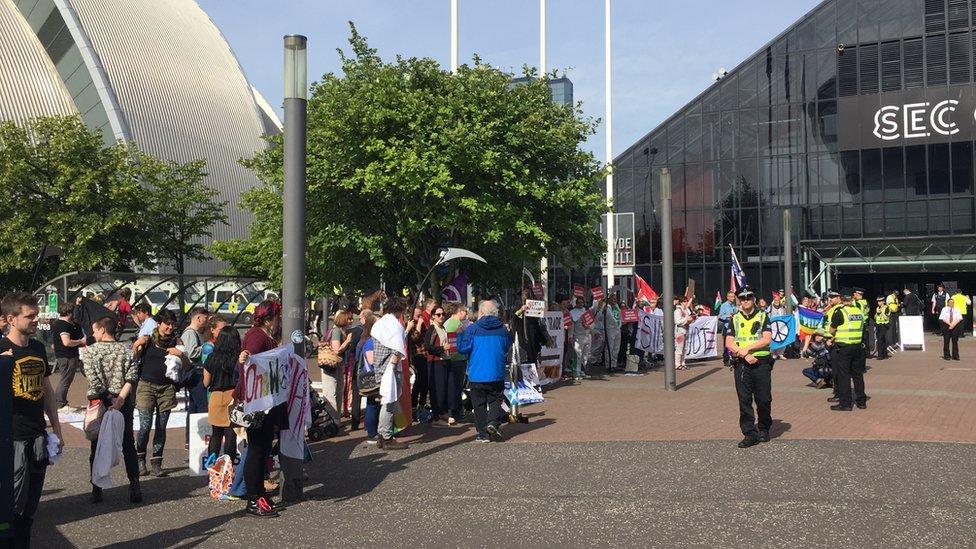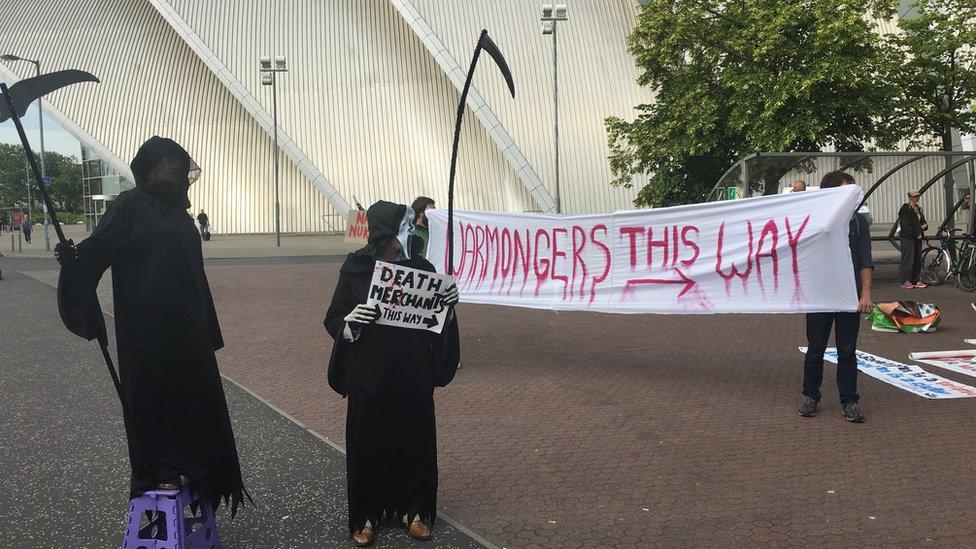Two arrested at protests in Glasgow to mark military fair
- Published
Glasgow arms fair draws protest
Two people were arrested as protesters gathered outside a controversial international military defence fair in Glasgow.
The Undersea Defence Technology conference is attracting 1,100 delegates from around the world.
The fair's lead sponsors, BAE Systems and Babcock International, have links to the Trident nuclear system.
Police Scotland said the two men arrested were charged with minor public order offences.
Meanwhile, the city's SNP administration has distanced itself from the event saying it was signed off before last May's elections.
Glasgow City Council and its events arm Glasgow Life have faced criticism for appearing to support the fair.

However, in a statement, council leader Susan Aitken said the authority had asked the city's promoters to vet future events.
She said: "The council is not responsible for the conference or contracts between conference organisers, the venue and accommodation providers.
"The contract was agreed before last May's local government elections.
'Re-examine policies and procedures'
"While we have a responsibility to support and promote the positive economic impact generated by the convention and events sector, we also understand that some people have expressed their opposition to this conference being held in the city.
"The City Government has therefore asked the Glasgow Convention Bureau to re-examine policies and procedures with regard to any support associated with winning convention and conference business for the city, so that, in addition to financial and economic criteria, the policy will examine wider strategic aims including being a human rights-supporting city and other ethical concerns.
"In addition, in light of the concerns raised about this particular event, the use of the People Make Glasgow branding has been removed."

Protesters started to gather at the event early on Tuesday
A number of activists groups and peace organisations staged demonstrations at the Scottish Event Campus.
Church of Scotland representatives will lead a prayer calling for peace.
Peace campaigners have also written an open letter of protest that will be sent to Glasgow City Council and other political leaders.
The Rev Dr Richard Frazer, convener of the Church and Society Council of the Church of Scotland, said: "We are disappointed that Glasgow City Council has chosen to support an international festival of the arms trade.
'Deeply uncomfortable'
"To facilitate such a gathering is deeply uncomfortable at a time when so many innocent people around the world are suffering from effects of war and the damage and destruction caused by weapons.
"Such a venture may bring income for some Scottish businesses, but we should be investing in a future that brings conflict and the need for weapons manufacture to an end.
"A conference like this fosters and legitimises an industry that causes untold suffering."
Dr Frazer said public bodies in Scotland should not be supporting or benefiting from a conference which facilitates conflict and destruction.
West of Scotland Green MSP Ross Greer said: "The arms trade profits from death and destruction across the world and it stains Scotland to have this fair in our largest city and with the support of public money.
"Just last week we marked World Refugee Day by stating our commitment not just to welcoming the stranger and offering sanctuary but to work towards a better, more peaceful world.
"Arms fairs have no place in that and I hope that this is the last one to cast its shadow over Glasgow."
Scotland Against Militarism and Campaign Against Armed Trade (CAAT) Scotland also dprotests outside the conference.
Glasgow attracts some 500 conventions and conferences each year, bringing in £130m to the local economy and supporting thousands of jobs.
The UDT Conference is organised by Clarion Events, one of the world's largest organisers of conferences, events, trade shows and exhibitions.
A spokesman for UDT said: "We respect the right to peaceful protest".